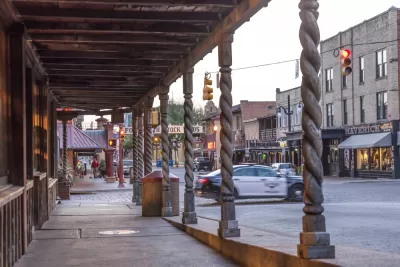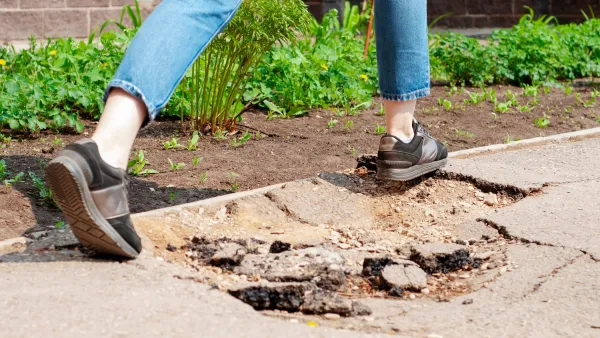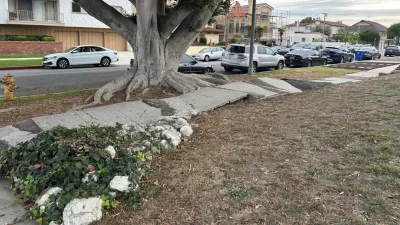A proposal in the city council could shift the burden of sidewalk repairs away from property owners, who are currently responsible for 100 percent of expenses.

After noticing the disparate states of sidewalks in different parts of her own neighborhood, Fort Worth journalist Emily Wolf examines the city’s sidewalk paving policy to find out why some sidewalks in the city are more well-maintained than others.
As it turns out, “Fort Worth has required private homeowners to maintain sidewalks since the 1960s, but stopped enforcing the penalties included in that ordinance several decades ago. What’s resulted is a patchwork of sidewalks in various states of disrepair across the city, with little recourse for owners with lower incomes or disabilities.” The issue is particularly evident in front of rental properties, Wolf notes. “Sidewalks in front of rentals, in particular, were often littered with large fractures and divots, the rentals’ owners far away from the realities of the area.”
Whether coincidentally or not, months after Wolf published a piece about the city’s inconsistent sidewalk policy and the challenges it poses for residents with disabilities, among others, “city staff presented a proposal to city council to establish a cost-sharing program similar to Dallas. Under the proposal, the city would use a portion of the fiscal year 2023 PayGo funding, totaling $2.6 million, to develop the program.” The program would have the city pay for 50 percent of the cost of repairs, “with a particular emphasis on low-income homes, seniors and disabled residents.”
FULL STORY: Walking the walk: government reporter explores the reasons for Fort Worth’s crumbling sidewalks

Planetizen Federal Action Tracker
A weekly monitor of how Trump’s orders and actions are impacting planners and planning in America.

Map: Where Senate Republicans Want to Sell Your Public Lands
For public land advocates, the Senate Republicans’ proposal to sell millions of acres of public land in the West is “the biggest fight of their careers.”

Restaurant Patios Were a Pandemic Win — Why Were They so Hard to Keep?
Social distancing requirements and changes in travel patterns prompted cities to pilot new uses for street and sidewalk space. Then it got complicated.

Platform Pilsner: Vancouver Transit Agency Releases... a Beer?
TransLink will receive a portion of every sale of the four-pack.

Toronto Weighs Cheaper Transit, Parking Hikes for Major Events
Special event rates would take effect during large festivals, sports games and concerts to ‘discourage driving, manage congestion and free up space for transit.”

Berlin to Consider Car-Free Zone Larger Than Manhattan
The area bound by the 22-mile Ringbahn would still allow 12 uses of a private automobile per year per person, and several other exemptions.
Urban Design for Planners 1: Software Tools
This six-course series explores essential urban design concepts using open source software and equips planners with the tools they need to participate fully in the urban design process.
Planning for Universal Design
Learn the tools for implementing Universal Design in planning regulations.
Heyer Gruel & Associates PA
JM Goldson LLC
Custer County Colorado
City of Camden Redevelopment Agency
City of Astoria
Transportation Research & Education Center (TREC) at Portland State University
Camden Redevelopment Agency
City of Claremont
Municipality of Princeton (NJ)





























